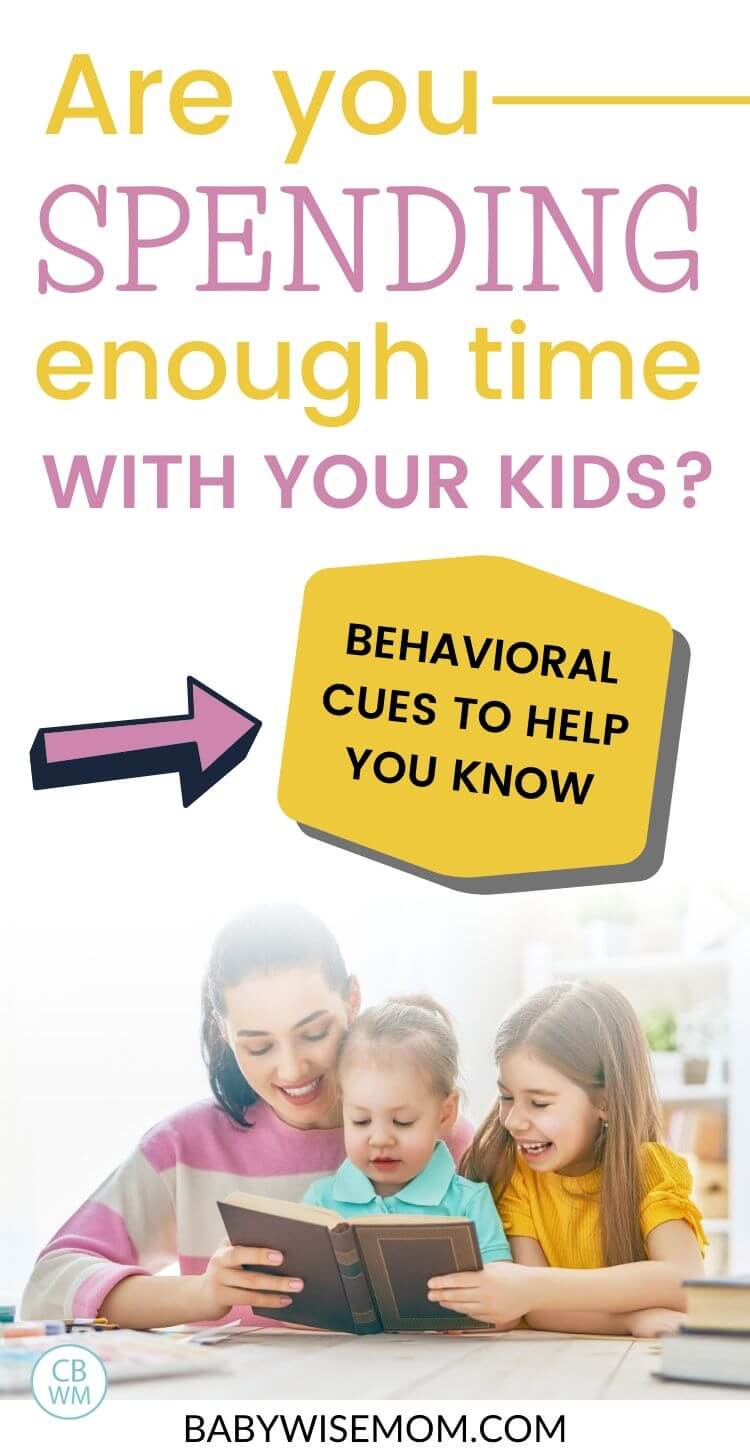

Many parents today find themselves feeling very guilty if they do not spend a significant amount of time with their kids each day.
No matter the age of your child, you want to balance the time you spend with her. Spending too little time AND spending too much time can lead to behavioral issues and developmental issues.
There is this middle ground between too much time and too little time.
On Becoming Preschoolwise 
“…the child who possesses healthy learning patterns has parents who used the preschool years as a learning environment”.
(page 118)
What does this mean? It means children who learn well have parents who spent time during the preschool years teaching the child. They did more than simply make it through the day. They were intentional during their time.
These parents “…stimulated and guided their child’s development…” (page 118).
And here is the key, these parents had balance. They didn’t spend too much time with the child and they didn’t spend too little time with the child.
Too much time leads toward the child not being able to be independent or develop focusing skills.
Too little time ends with the child not having developed learning skills. The child has also not been required to develop his attention span.
Post Contents
How Much Time Should You Spend With Your Child
So how do you know how much time is too little time and how much time is too much? I know this is a concern for parents. I get this question quite often, actually.
There definitely isn’t a magic number I can give you, “X number of hours is just right.” But there are some hints to help you along the way.

ROUTINE
“The first step in a balanced approach to preschooler training is to develop a daily plan”
(page 118)
Simple right? You just have planned activities that focus on the skills and character traits you want your child to develop.
It really can be as simple as constructing a daily routine and following it most days.
You want activities where your child plays independently. You also want activities where your child plays with a parent, and perhaps siblings and friends when appropriate.
Through your daily routine activities, you will help your child develop skills needed in school and in life.
Let’s go through the activities in a day. You will see that applying these activities will fill up your child’s day and naturally answer the question for you if you as to how much time to spend with the child.
Mom Decides
An important point here is that mom decides the routine. This doesn’t mean you never give your child a choice at all during the day, but it means you decide what type of activity is happening, and often what happens during that activity time, though there will be times you will give the child options. “…a child’s attention span develops best in a structured environment” (page 119).
So as you plan your daily routine, plan for how long you will do each activity. As your child gets older, add time spent on each activity. This will help increase the attention span.
>>>Read: “Mom, not baby, decides…”
Independent Playtime
Independent playtime is done alone. This activity is so valuable and so important.
“Concentration and creativity are developed during independent play”.
(page 120)
Independent playtime is what helps your child learn and develop focusing skills.
“Focusing is the ability to concentrate on an object or activity without being distracted by surrounding sights and sounds”.
(page 120)
Whether you plan to home school or send your child to school, I am sure you can see that this is important. No matter where the child learns, there will be distractions.
Independent play has some criteria to meet before it can really help develop focusing skills.
>>>Read: Independent Playtime: The Ultimate Overview
Independent playtime must be first chosen by mom. Mom decides when it happens.
If your child wanders off and plays on his own for 45 minutes, that is nice for you, but it doesn’t aid in developing focusing skills. If you start it but allow your child to decide when to end it, you are not practicing it correctly for developing focusing skills. He also needs to be by himself with no TV or video games.
“The most important aspect of this time is that your child is learning to focus on what he can do with the things he has…at an assigned time in an assigned place”.
(page 120)
During this time, you want your child to be able to play without other family members distracting him. He won’t be able to build his focusing skills if he has you walking by talking on the phone or if he gets visits from siblings.
You also want to keep toys rotated and interesting.
>>>Read: How To Start Independent Playtime Late
Blanket Time
Blanket time is done independently, but in the room with mom or dad. The exact age range that parents implement blanket time varies.
Blanket time is an independent, structured activity. Mom is in the room with baby, but it isn’t mom playing with the baby.
Nap/Rest Time
Nap/rest time will be a part of your child’s day she does alone. The time spent during nap/rest time varies based on age and child’s individual sleep needs.
Sibling Playtime
Sibling playtime is done with a sibling. A parent might be near by, but not WITH the kids typically.
If you have more than one child, have time spent each day where they play with each other. This can happen in the form of free play (where the children decide what they play with/do) or structured play (where mom decides).
>>>Read: Structured Playtime With Siblings {Sibling Playtime}
Free Playtime
Another category to have in your day is free play. This is play when you allow your child to choose the activity.
It could be coloring, playing outside, or doing a puzzle. I would start off with younger children giving two choices and letting them choose. As they get older, add three. Some day, when your child is ready, you can allow the child to choose something. This might be time with parents, siblings, or alone.
>>>Read: How To Use Free Playtime In Your Child’s Schedule
Learning Time
You can also have learning time in your day. This is when you can do an activity aimed at increasing knowledge and understanding on some topic.
There are tons of resources available to help give you ideas both in books and on the Internet. I help write a blog full of ideas: Children’s Learning Activities. This is time spent with a parent. There might also be time with siblings.
>>>Read: How To Do a Learning Activity of the Day
Meals
Another natural part of your day will be in meals and possible snack times. This is time spent with parents and siblings.
Bathing/Getting Ready
You will also have baths, getting ready for the day, and getting ready for bed. This is time spent with parents and possibly siblings.
Reading Time
Taking the time to read to your child each night or day has so much value for reading skills. It is also great bonding time to spend with your child.
Family Time
I like to have family time each day. We spend time as a family playing and working together. We also have special activities we go to together some days. This is obviously time with parents and siblings.
Outside Time
During nice enough weather, I like to make sure we play outside each day. So this is an idea for you. It might be a walk, trip to the park, or just playing in your yard. This will be time with parents and siblings.
Chores
Your little one should have chores each day. These might be done with someone or independently.
>>>Read: Preschooler Chores: 12 Chores for 4 Year Olds
Whew! That is a full day! I think if you add most of these things to your routine, you won’t have time to wonder what to do with yourselves and you won’t have to worry about how your time is being balanced.

BEHAVIORAL CUES
You still might find yourself worrying if you are spending the right amount of time with your child or not. Is it too much? Is it too little?
We have a great list of ideas of how to fill your day above, but how much time do we allocate to each activity? Here are some questions to consider:
- Is my child’s level of independence appropriate for his age? If he does not have enough independence skills, you likely need to have some more independent time in the day. You also might need to make sure you back off while you are together and let him learn. If he is too independent, you likely need to add some parent/child time to your day.
- Can my child focus well for his age? If not, he needs more independent time in the day.
- Does my child come to me saying he is bored? If so, you are likely trying to have too much independent time without offering enough structure and guidance for that time. This means you might need to add some parent/child and/or social activities to your day. You will definitely need to make sure you are deciding the activities and when they start and stop.
- Can my child play with one toy for an extended period of time? If not, he needs more structure in his day. He needs mom to tell him when activities start and stop.
- Does my child whine a lot? Does he follow me around the house? Again, he needs more structure and needs mom to direct his day.
- Does my child throw tantrums and seem emotional? Is he suddenly disobedient? If so, he likely needs more time with parents in the day. If the child does not get enough time spent with parents, he will start to seem a bit anxious. He will likely cry easily and likely start to disobey.
- See this post for more discussion on the topic: How Much Time Should You Spend With Your Child Daily
IT’S DYNAMIC
Keep in mind this whole scheduling is dynamic. Needs change over time. Siblings enter the picture. Abilities change over time. Keep reevaluating and have things age-appropriate as best you can.
Conclusion
It won’t always be perfect. There will be tweaking you will need to do. That is fine. That is all very natural. You will get better at it as you gain more experience and get to know your child better.
Remember, life is a journey, not a destination.
RELATED POSTS
This post originally appeared on this blog June 2010
